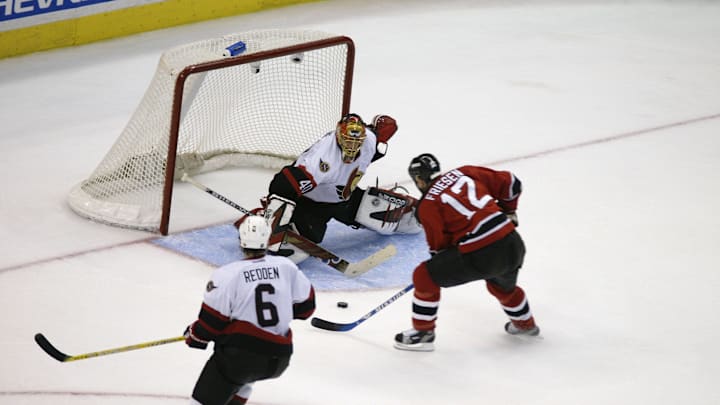1. Jeff Friesen's late third period Game 7 goal helps Devils eliminate Senators in 2003 Eastern Conference Finals
Senator fans often debate the greatest team in franchise history. The 2002-03 Senators could have the edge of being the best team with being the only Senators team to ever win the President's Trophy. Senators legend Chris Phillips named the 2003 team as the best.
After cruising their way through the first two rounds of the 2003 playoffs, the Senators met the Devils in the 2003 Eastern Conference Finals. At the time of the series, the Devils had won two Stanley Cups and played in three Stanley Cup Finals over the past eight seasons, but the Senators appeared ready with their dominate team and having home ice advantage.
The Senators won Game 1 in overtime with Shaun Van Allen scoring the overtime winner, but the Senators dropped the next three games to trail 3-1 in the series. However, the Senators won the next two games, including Phillips scoring the overtime winner on the road in Game 6 in New Jersey to set up a Game 7.
The energy inside Corel Centre for Game 7 was off the charts. The arena was buzzing early when Magnus Arvedson scored 3:33 into the game, but Jamie Langenbrunner scored twice in the second period to give the Devils a 2-1 lead heading into the second intermission.
When Radek Bonk scored 1:53 into the third period to tie the game, the scene was set for an unforgettable finish. Both teams had chances to take the lead, but Patrick Lalime and Martin Brodeur had other ideas. That was until late in the third period.
One name that haunts every Senators fan is Jeff Friesen. With 2:14 remaining in the third period, Grant Marshall got a pass through the skates of Wade Redden and Friesen scored to give the Devils a 3-2 lead. The Devils defense and goaltending prevented a tying goal and the Senators would be eliminated in a brutal way to end the season.
Had the Senators completed the 3-1 comeback, they would've faced the Mighty Ducks of Anaheim in the 2003 Stanley Cup Finals. The Devils won the series in seven games, so Senator fans and the team had the thoughts of "it should've been us" on their mind.
With the 2003 Eastern Conference Final loss happening at home, it makes the playoff series loss worse. It also denied the Senators of making their first Stanley Cup in franchise history.
